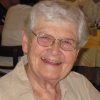Maryknoll Sister from the Philippines and Tanzanians discover together that mission is about relationships
Upendo, which means love in Swahili, refers to the two groups of HIV-positive people with whom Sister Natividad meets regularly. The 50 members come together to pray, share a meal and speak of their worries, pains, joys and sorrows. One of the sufferings they must endure is poverty, she says, because they are often denied work due to their sickness. “There is a stigma attached to having HIV/AIDS,” Sister Natividad says.
At one of the Upendo meetings, Sister Natividad asked the members, who are mostly women, if they were interested in doing something that would help them earn money. “They decided that if they could make soap, it would not cost too much to produce and is something everyone in the community needed,” says Sister Natividad. And so the project was born! Members not only share the profits, she says, but are also doing something useful and productive, which lifts their spirits and gives them courage.

In the Chanua project, Sister Genie Natividad (l.) teaches Felista Rusuvula and other Tanzanian women to convert scrap cloth into items to sell to support their families.
The desire to serve people in such a way is what drew Sister Natividad to mission when she was growing up in the Nueva Vizcaya Province of the northern Philippines. “Reading We Do It for Jesus, a book about Mother Teresa’s work, stirred my passion to serve the poorest of the poor,” she says, adding that she joined the Maryknoll Sisters because their charism is “to reach out to people on the edge, wherever we find them all over the world.”
In addition to her ministry at Upendo, one day a week she makes her way to Karibu (Welcome) Center for abused children. There she meets with children whose sufferings include being beaten, burned, raped, rejected and abandoned. They participate in a program that uses various methods to calm and heal them from trauma, including music, exercise, breathing exercises and psychotherapy. Sister Natividad works with a group of 21 boys and 14 girls. “It is so sad to see children suffer such tremendous pain and sometimes atrocities too horrible to mention—from their own families,” Sister Natividad says.
She tells of two little girls who were so traumatized by their mothers that neither one was walking or speaking when she started working with them. “Aisha was badly beaten by her mother,” Sister Natividad says. “Mwajuma was so starved and neglected by her mother that when found, she was just skin and bones.” After working with the girls, the missioner says, “Now, every time they see me, they come running to meet me, hug my feet and just want to be hugged and cuddled on my lap! These two precious angels give me so much joy, as I see them transformed from wounded victims of abuse to joyful, sweet, loving children.”
Karibu Center also works with the abusers, often a parent or guardian, in hopes that through counseling, they, too, may be healed of the deep anger within them, which causes them to abuse their children. Abuse, she says, is often connected to poverty. “Parents and guardians often don’t have the means to support their children and they are angry,” she says. “Some adults were abused themselves and now abuse their children.” The Karibu program, she reports, has had some success in happily reuniting children with their parents, grandparents or other family members.

Playing guitar, Maryknoll Sister Genie Natividad accompanies children as they sing and heal from trauma and abuse at the Karibu Center in Mwanza, Tanzania.
Sister Natividad also collaborates with Costansia Mbogoma, a Tanzanian Maryknoll Affiliate and former student of the Maryknoll Sisters. Together they provide books, uniforms, shoes and other items to 60 very poor youth between the ages of 7 and 16 to enable them to go to school.
Mbogoma, a widow and the mother of seven grown children, has opened her home as a place where she and Sister Natividad help the mothers and grandmothers of these youth to learn income-generating skills to support their families. “I want to share what I have received, especially from the Maryknoll Sisters,” says Mbogoma. “Maryknoll has become part of us. They (Maryknoll missioners) have no boundaries and come and learn our ways.”
Sister Natividad says she and Mbogoma hired someone to teach the women to make ‘tie-dye’ clothes to sell. “I taught the women to convert scrap cloth into salable items such as greeting cards, aprons, pot holders and bedspreads by cutting the scraps and sewing them together,” the Maryknoll Sister says, adding that the women have become quite expert at this, and profit from sales of the items is shared among the members. The women have opened a shop called Creations with three other charity groups, which enables them to sell their products all year round.
The women’s group bears the name Chanua, which means blossom, and blossom, says Sister Natividad, is what they have done. As their success has increased and their relationships with each other deepened, she says, what began as a simple undertaking has developed into a mission of mutual help and development.
Reflecting on her ministries, Sister Natividad says, “I have learned that mission is about building relationships with God and with each other. Jesus teaches us, ‘I am the Way, the Truth and the Life.’ By being there, accompanying them and showing them the way, we have helped these women discover that together and with God’s help they are able to move mountains. They discovered this truth about themselves, and as a result, they are now able to sustain and truly celebrate life.”
Featured Image: Sister Genie Natividad holds child of a participant in Upendo support group for people with HIV/AIDS.

